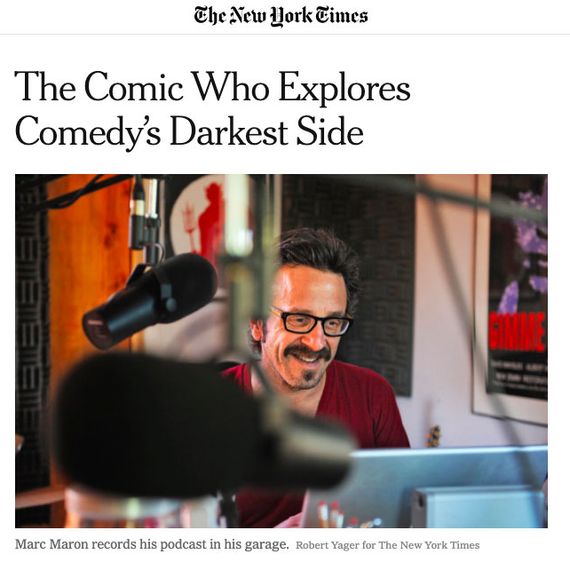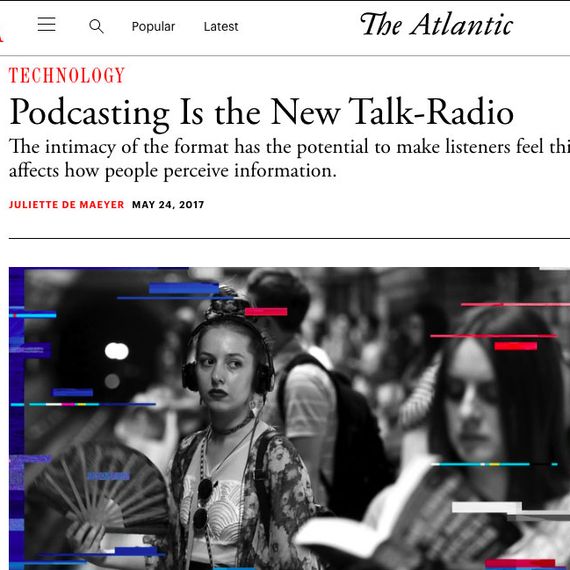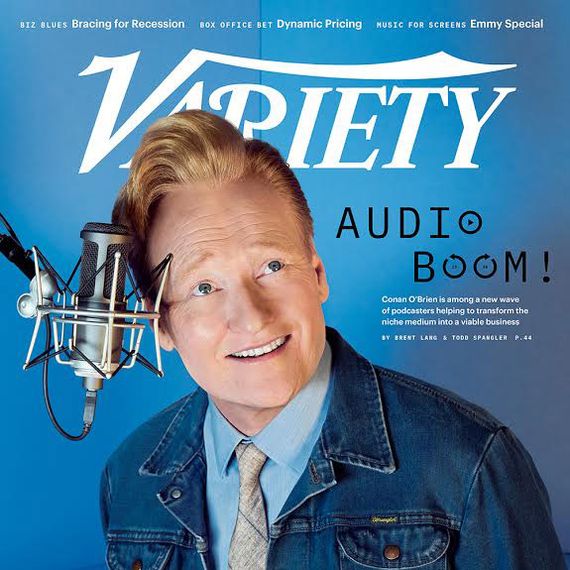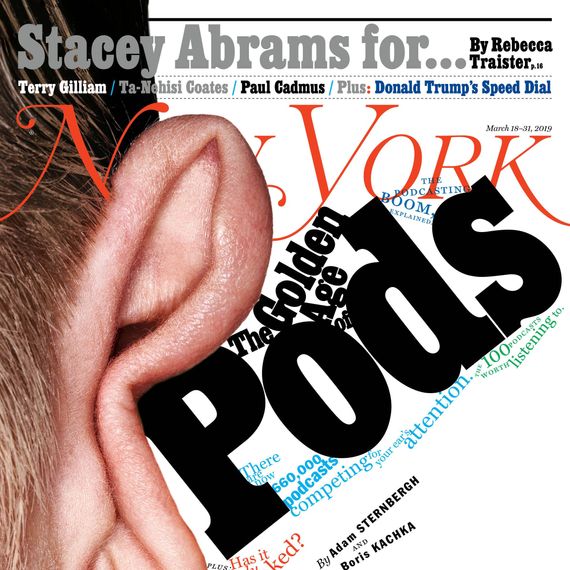
Podcast coverage has a peculiar history. Whether fueled by wishful thinking or impatience, the media’s takes on the format often come in fits and starts. Many outlets have declared podcasts “the next big thing” over the years, and there’s been a lot of discourse surrounding podcasting’s perceived booms, busts, and even blips. Commonly pegged to the seemingly never-ending stream of new shows, discussions of the “golden age” or “peak” of podcasts are regularly had. Articles compare the podcast boom to the Wild West and the American gold rush. (Yes, Vulture has been guilty of it too.) It’s all very amusing. And, when compiled, all of this breathless coverage reveals just how difficult it is to capture something with a community ethos through an industry lens. Here we celebrate podcasting’s sweet 16 with a look back at some of the more excited articles — including our own — from the early days.
“Audible revolution”
The Guardian, February 11, 2004
“We will not go back to genuflecting to all these one-way top-down ways of disseminating news.”
Ben Hammersley coined the word “podcasting” in The Guardian in 2004. And while creators and consumers began to pick their preferences among now forgotten mp3, ogg, and .wav files, Christopher Lydon, the current host of Open Source, assumed the role of podcast preacher. “This is something that newspapers can only dream about,” he said, before declaring, “we will not go back to genuflecting to all these one-way top-down ways of disseminating news.”
“Podcasting: It’s all over the dial”
“Once upon a time in America, during the gilded reign of Johnny Carson, the rules were clear: Hollywood provided the candy, and people made time to devour it. But this Web-based phenomenon puts the real back in reality programming, emanating not from slick studios but Anyhome USA … ”
Almost a year to the date after podcasting’s christening, USA Today drops a one-two punch with “Podcasting: It’s all over the dial” and “Radio to the MP3 degree: Podcasting.” The tone is both condescending — referring to podcasts as “amateur chatfests” — and cautionary, claiming that they’re coming for Hollywood, big tech, and media companies alike. Podcasting’s “raw power” sounds delightfully disruptive, and an origin story forms. (What exactly are the big numbers instilling this fear, you may wonder? 9,000 downloads.)
“The Sizzle and Pop of Radio Cooking”
The New York Times, March 22, 2006
“In a world of glossy food magazines, $50 cookbooks and television hosts who seem to care more about make-up than marinades, a quieter, cheaper and decidedly more old-fashioned way to explore cooking is getting new play.”
Like any medium, podcasts see their share of genre-focused coverage. While comedy gets singled out most often, this article focuses on cooking podcasts, stating that “at the bottom [of the food media market] with a bullet are hundreds of food podcasters, whose ranks have been growing in number and quality almost daily.” Consumers are thus introduced to a rise in the popularity of food-related podcasts.
“Authors Find Their Voice, and Audience, in Podcasts”
The New York Times, March 1, 2007
“Compared to audiobooks, these authors break every rule in the business …”
The early reporting on podcasts continues to push the narrative of a previously uninhabited land becoming a space for rebellion and renaissance. Here the scope is smaller, focusing on authors who are taking advantage of podcasting in a way that allows “them to break every rule in the business,” according to The New York Times. They mean the podcasters “use music and a full cast more liberally than traditional audiobooks.”
“The Death of Podcasting and the Rise of Videocasting? No, It’s About Options”
“In the end, it’s about engaging your audience. But since users take in information from different sources and different mediums, the best podcasters and videocasters must do the same and spread their message across multiple platforms.”
After videocasts catch fire in 2004, Mashable teases that the rise of videocasting will mean the death of podcasting before ultimately declaring, “podcasting is far from obsolete.” The article is one of many that question whether podcasting is really the next big thing or rather one part of something more. The questions surrounding videocasting will continue into the present.
“The Comic Who Explores Comedy’s Darkest Side”
The New York Times, January 6, 2011
“But because the podcast is the perfect format for what he’s doing, allowing for all that intimacy and depth (and raw language), it’s easy to imagine some of the appeal being lost in the translation.”
The New York Times comes in hot with a profile on Marc Maron and his seminal podcast WTF with Marc Maron. A few months later, Jesse Thorn’s conversation with Joshua Benton for NiemanLab confirms that Maron revived podcasting after it peaked in 2005/2006. A charming time capsule, the article also sees Thorn confirm that Maron’s name is pronounced Marin — not Marrone. But something is brewing underneath; Thorn casually mentions that Joe Rogan also “has a podcast.”
“The 10 Best Comedy Podcasts of the Moment”
“Ricky Gervais is the voice that launched a thousand comedy podcasts. The Ricky Gervais Show was a Velvet Underground-like lodestar of inspiration that also managed to put up Bieber/Gaga numbers. ”
Rolling Stone’s “The 10 Best Comedy Podcasts of the Moment” is perhaps the first proper listicle devoted to podcasts. It aims to help readers navigate the “crowded field of comedy podcasting,” which “is now teeming with competitors,” and it asserts that Ricky Gervais, not Maron, is the “Podfather.”
“Are we nearing comedy podcast overload?”
“A comedian discovers a way to communicate directly with his or her fans, and suddenly every other comic tries to reverse engineer this template for success, hoping lightning will strike twice. But it never quite does. Then some other inventive comic breaks new ground and the process repeats itself.”
Almost a year after the Rolling Stone list, The A.V. Club decides there are too many comedy podcasts. The author says Earwolf’s 17 and Nerdist’s 15 podcasts are overkill and pleads, “but for the good of comedy, people need to stop creating new [podcasts],” adding, “if the podcast pool stopped growing today — if every comedian with a germ of a podcast idea decided to go in a different direction — nothing would suffer.”
It also piggybacks off a question posed by The New York Times a month earlier asking what will happen to stand-up if comedians sit down. “Stand-Up Comedy Without the Stand-up. Or the Comedy” says that while there may already be too many podcasts, stage performances are still superior and that comics with podcasts were “like subtenants in an illegal loft building of show business.” However, that insult is not extended to Maron because “no comic does podcasting better, or seems to have a better intuitive understanding of what that transition involves.”
“Remember podcasting? It’s back - and booming”
“The land of podcasting, once an esoteric outpost devoted to heavily tech-oriented chats, is booming. Actor Alec Baldwin, Extra’s Maria Menounos and comedians Joan Rivers, Jeff Garlin and Tom Green all recently threw their hats into the podcasting ring alongside CBS, NBC, ABC and Fox, which now offer audio versions of many of their TV news shows.”
Though it’s unclear where podcasts went, USA Today reminds readers not only that podcasts exist, but that they are booming. The article says, “the land of podcasting, once an esoteric outpost devoted to heavily tech-oriented chats, is booming,” citing Apple surpassing 1 billion subscriptions for podcasts on the iTunes app.
“‘Serial’ Podcasting’s First Breakout Hit, Sets Stage for More”
The New York Times, November 23, 2014
“Podcasting used to be a novel way of distributing audio programming over the Internet, but it is up 25 percent year-over-year and almost 40 million people listen to some form of podcast. It gained traction with the introduction of the iPod, hence the name. Serial is arguably the medium’s first breakout hit. … To call something the most popular podcast might seem a little like identifying the tallest leprechaun, but the numbers are impressive for any media platform.”
Serial did change the podcasting landscape, which in turn changed podcast coverage. Everyone weighed in; most mentioned that podcasts would do to radio what Netflix had done to movies.
“The Future of Media is Podcasting”
Fast Company, February 9, 2015
“As moviegoing wanes, cable bundles crumble, and TV ratings wither, those businesses will have to increasingly diversify their revenue models. The experience of podcasters may offer many useful lessons. Podcasting is built on the very assumptions that older media have been forced into making, due to technological advances that have ruined their historic pursuit of a mass audience gathered at a single, scheduled time.”
Still reeling from Serial’s success, Fast Company declares podcasting is the future of media. The article asks, “Who knew the hottest entertainment form would be audio?” But there is a caveat: “Still, the podcasting business faces one major roadblock to expanding its own success: There’s no Netflix-style service that tells you what you’d like based on what you consume.” The rise in podcasting’s popularity is said to be a result of cars and celebrities, but also advertising. It’s worth noting that this is the year WTF With Marc Maron scores an interview with sitting president Barack Obama.
“So, Like, Why Are We So Obsessed with Podcasts Right Now?”
“But the screen devices that enslaved our gaze and bathed it in artificial moonlight also gave birth to an audio renaissance — the rise of the podcast. Podcasts are essentially radio on the installment plan, a return to the intimacy, wombed shadows, and pregnant implications of words, sounds, and silences in the theater of the mind.”
Vanity Fair pops in to ask why we care about podcasts so much. They explain, that, “as commercial radio trashed itself with too many commercials, demographic narrowing (in many markets, pitching to the Aging Angry White Male), and the incessant pandering of the religious/right-wing tom-tom drums, podcasts redeemed the medium by restoring its lost creative promise.”
“An Island no more: Inside the business of the podcasting boom”
“How hot is podcasting? Stupid V.C. money hot.”
Other choice descriptors from the first installment of a five-part series on podcasting include the word “mainstream,” the phrase, “the next big thing,” and the declaration, “The biggest aspiration of the day: to become the Netflix of spoken audio.” Then in November Radiolab’s Jab Abumrad tells The Guardian that while “rooting for the podcast boom,” he’s “worried it may be a bubble waiting to burst.” He goes on to argue for dedicated podcasting schools: “I hope more than anything that we start to treat our business like film treat their business. Film has film school and production school where people can go to learn how to do it … there are journalism schools but they are all closing.”
“Podcasting is the new…”
The Atlantic May 24, 2017 & Columbia Journalism Review December 12, 2017
“Freed from the stranglehold of objective or neutral reporting, podcasters act as storytellers rather than merely as journalists, allowing them to take their audiences around unexplored territories that listeners can experience, and maybe care about.”
Surprisingly, no one here says Netflix. In May, The Atlantic says, “Podcasting Is the New Talk-Radio,” saying podcasts can “bring you to places you’ve never been, they give you the impression of sharing an animated kitchen-table banter (or a loud bar argument) with a couple of friends.” In December, Columbia Journalism Review says, “Podcasting is actually the new personal essay” and rallies against the idea they’re dead: “The most exciting personal essays today, arguably, are being delivered via microphone and recorder.”
“Listen up — again! The Podcast boom is still just getting started”
Chicago Tribune, February 16, 2018
“So are we at peak podcast? Not even close.”
The year 2018 in terms of media coverage of the never-ending podcast boom seems tame compared to what’s about to come, minus a gripping headline from Independent Australia that asks, “Is podcasting the new Gutenberg Revolution?” Elsewhere, a more measured hope blossoms. The Chicago Tribune, for example, is confident “podcasting’s time is here.” The paper posits, “We’re now almost past the days when journalists have to explain to the uninitiated that a podcast is a show that you download, usually for free, to your computer or smartphone, then listen to at your convenience.”
“Podcasting’s New World: Groupies, Stage Fright and Sold-Out Shows”
The Wall Street Journal, April 9, 2018
“Podcasters are the new rock stars of the touring circuit. A niche industry only a few years ago, the most popular podcasts now draw millions of steadfast listeners, and their hosts and producers are capitalizing on that connection by taking their audio shows on the road.”
The “sex sells” adage sidles up to podcasts, and this iteration of the boom reveals some startling undertones. The Wall Street Journal’s exposé mentions fans of the horror-movie podcast The Last Podcast on the Left waiting “for hours to meet the three hosts, sometimes presenting them with ‘gifts’ such as vials of blood and a relative’s cremains.” Meanwhile, The New Yorker publishes “How Podcasts Became a Seductive—and Sometimes Slippery—Mode of Storytelling” in November, which mentions that the intimate nature of podcasts “can become manipulative.” The article also mentions a certain Joe Rogan three times. Is this the new Podfather?
“The Golden Age of podcasts”
“The 1930s and ‘40s, the era of Jack Benny, “The Shadow” and Orson Welles’ “War of the Worlds,” has been referred to as the Golden Age of Radio. Today, we’re living in the Golden Age of Podcasts.”
In 2019, everyone really goes wild for podcasts, but still can’t decide if they’re booming or busting. Only 20 days into the new year, CBS News publishes “The Golden Age of podcasts.”
“The Great Podcast Rush Is Just Beginning”
New York and Vulture, March 18, 2019
“What’s more, these humble chunks of audio have emerged as the most significant and exciting cultural innovation of the new century. In an age when we were promised jet packs, or at least augmented-reality goggles, it turns out what we’ve really been craving is the companionship of human voices nestled in our ears.”
Not long after, New York magazine and Vulture also go for the gold with a package about “The Great Podcast Rush.” In March, we say, “The Capitalists Are Here!” Are we in a podcast bubble? before explaining How Podcasts Learned to Speak: The once useless-seeming medium that became essential. We understand the podcast’s journey: “Perhaps it’s tricky to pinpoint the exact arrival of podcasts because they’ve spent a decade in a state of perpetual arrival. In any case: They’re here.” We also call Ira Glass, “the spiritual godfather of podcasts.
“Podcasting’s Netflix Moment: the global battle for domination”
“Global hits – from the ground-breaking Serial to Up and Vanished, and TV crossovers such as Dirty John — and Spotify’s plan to spend up to $500m on leading producers have made podcasts a hot media property.”
The Guardian hits the gas, publishing the headline “Podcasting’s Netflix Moment” in March. The race to become the Netflix of podcasting is presented as a bloody battle among such networks as Apple, Luminary, and Spotify. Experts weigh in as well: “A Netflix moment is a very accurate characterisation of what is happening in podcasting,” says Wondery founder Hernan Lopez tells the paper. “I would say we are reaching an inflection point. Huge numbers of people are realising that there is great content available that isn’t offered by traditional players.”
“Are podcasts killing music or just wasting our time?”
The Washington Post, April 17, 2019
“I’m about to kick a hornet’s nest — and if this were a podcast, you would now hear the crunch of a boot perforating a hive, followed by the intensifying hum of inconvenienced hornets. But, fortunately, this isn’t a podcast, so my punt shall remain silent, and here it is: I’m against podcasts.”
In April, The Washington Post publishes a disparaging article that frames podcasts as a time suck at best and an audio nightmare at worst. The piece cites the medium to be “tedious and samey and sedative,” before using the term “big podcast.” It also says podcasts don’t sound as good as music before the author concludes, “whatever asks for our most attentive listening should aspire to be the most worthy of it.”
“Have We Hit Peak Podcast?”
The New York Times, July 18, 2019
“Like the blogs of yore, podcasts — with their combination of sleek high tech and cozy, retro low — are today’s de rigueur medium, seemingly adopted by every entrepreneur, freelancer, self-proclaimed marketing guru and even corporation.”
In July, a divisive article from The New York Times titled “Have We Hit Peak Podcast?” comes out. The deck answers the question immediately: “If past experience (cough, blogs) is any indication, a shakeout is nigh.” Steve Pratt, a veteran CBC producer, points out that “just because Joe Rogan can do it well, doesn’t mean the average Joe can.”
“How Conan O’Brien and other top hosts are driving the podcast revolution”
“Despite its star’s initial reservations, “Conan O’Brien Needs a Friend,” an interview program in which the late-night comic engages in free-form chats with everyone from “Barry” creator Bill Hader to historian and Pulitzer Prize-winning author Robert Caro, has become the breakout hit of the audio season.”
The article hits most of the expected notes, such as naming yet another Podfather — “Conan O’Brien never planned on becoming the darling of the podcasting world” — and comparing the “niche medium” to a gold rush: “A big reason for the new investment is a mounting belief that podcasting is untapped land with gold to extract.”
“We’re Entering the Era of Big Podcasting”
“There were a few bumps here and there, of course, and while some of those bumps drove people elsewhere, those who stuck around saw themselves part of a tiny village that grew into a vibrant town — which then exploded into an industrious city, one that can be tremendously hard to keep up with.”
In September, GQ says, “podcasts have conquered the world” in An Oral History Of The Podcast. Quoting Ira Glass, the Wild West is mentioned again —“There’s a gold rush going on right now. It’s a Wild West. And it’s going to be funny to see how it plays out,” says Glass. Additionally, an unexpected Podfather is named: “If there’s one man who could be called ‘The Podfather’, it’s probably Dave Winer, a US software developer, entrepreneur, and writer, who the BBC named ‘the father of blogging.’”
That same month, Vulture starts tagging stories with “There Will Be Podcasts.” Those stories include “We’re Entering the Era of Big Podcasting,” which focuses on the influx of money the medium is experiencing. Meanwhile, Fortune and Forbes start mind-melding by publishing “How Spotify Is Making Podcasts Hot Again” and “Podcasting Is Going Mainstream,” respectively.
“Joe Rogan Is the New Mainstream Media”
The New York Times, May 25, 2020
“Imagine if I had told you, a dozen years ago, that the former host of ‘The Fear Factor,’ an MMA color commentator who loves cool cars and shooting guns and working out, a guy with a raw interview show featuring comedians, athletes and intellectuals, was more influential than the entire slate of hosts on CNN.”
Bari Weiss, a self-proclaimed friend of the host of The Joe Rogan Experience, writes, “When I saw the news that the king of all podcasting, Joe Rogan, had inked a deal with Spotify for his widely popular show I texted to congratulate him on getting crazy rich. How rich?” The answer is more than $100 million. This is what sixteen years of booming delivers — listeners are at the mercy of … not Marc Maron, not Ricky Gervais, not Ira Glass, not even Conan O’Brien but the former host of Fear Factor. Weiss describes Rogan not as a man, but as “a mirror, when so many publications are broken glass, capable of reflecting only a shard.”
“Vulture to Double Podcast Coverage”
“Vulture today announced that the site is ramping up coverage of podcasts, as the medium attracts more listeners and the site’s readers are hungry for podcast news and reviews.”
Just last week, Vulture breathlessly announced the introduction of its new section and newsletter devoted to the booming genre, claiming that its readers were “hungry for podcast news and reviews,” thus cementing the true arrival of podcasting as a medium.





